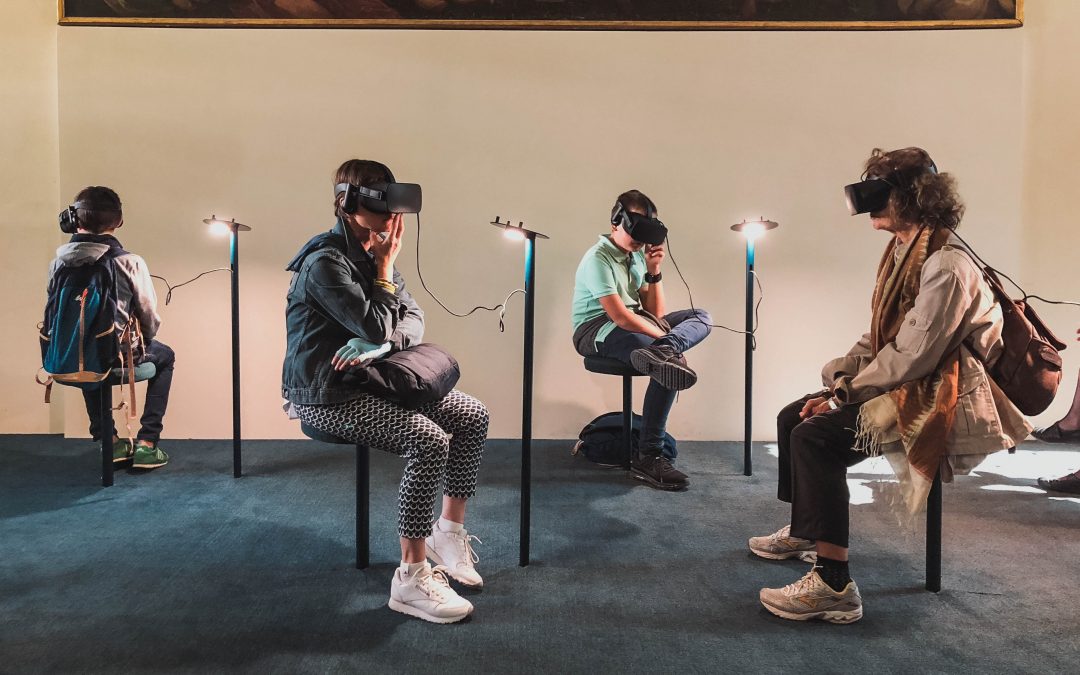
by admin | Jun 17, 2020 | Virtual Events
We learned it the hard way that not everything goes according to plan.
The event industry took hit after hit, proving this without a doubt. Online events, its Plan B, has now officially become the primary plan. The game rules have changed, we might think, but in reality, not so much.
All it takes for a successful virtual conference/event is a little planning.
Why the special treatment?
Whether they are teleconferences, webinars, podcasts, or hybrid events, online events need the same planning and attention as their offline counterparts. Hosting virtual events is not just about finding the perfect platform and then publicizing the event. It is about being meticulous in planning, armed with enough knowledge and an all-encompassing checklist.
A checklist that covers the most important aspects of virtual events works equally well for veterans and beginners. It not only ensures that you don’t miss things by checking things off (a wonderful feeling in itself) but also gives you a platform to measure your goals against your actual achievements.
What must the virtual event checklist cover?
The primary duty of a checklist is to aid you in pulling off the event seamlessly. This is why the list needs to be exhaustive. Does it remind you of things easily forgotten? Does it ensure that the basics are not overlooked? Does it add that extra layer of a surety that you can benefit from?
You could overlook several things while putting together a virtual event, so, adopt the following checklist we have put together for you.
-
What is the event objective?
It is the beginning of it all. It is where you determine the reason for conducting this event. Is it to educate your audience on a particular event? Or is it to market a specific product you’re proud of? Or maybe, you just want to generate some leads and garner potential customers. Whatever the objective, you must first decide on one because your entire event revolves around it.
-
Who is your target audience?
Once your objective is in place, it is time to identify your target audience. Who do you want to talk to? Which faction of the population do you think your event will benefit or influence? You need to narrow down your preferred audience for maximum impact.
-
What type of event do you want to host?
Your objective will give you an idea of what kind of event you would have to host to get your point across. Will one session do, or do you have to go for a multi-day event? Does it have to be a running series? These questions are essential for you to create the content for your event.
-
What platform will serve you?
Once you have an idea of the kind of event you want to host, it will clarify the platform that would suit your needs. You need to choose one that suits your audience and your purpose well. Research well on the different functionalities offered by other platforms and make sure your virtual conference checklist has it as a priority.
- Who will be your speakers?
When you select speakers for your event, keep in mind that they should have a good grip on the topic at hand. They must also be comfortable doing virtual events because, depending on the platform, the experience will be quite different from its offline counterpart. You must also decide on how many speakers you need for your event. A panel will be the best choice in most cases, which means you need more than two speakers.
-
When will your event take place?
This one is simple. Fix the most appropriate time and date for your event, depending on your audience’s geographical location, speaker availability, and varying time zones. We said simple, not easy.
- How engaging is your content?
Always, always have a structure laid out for your content. Fight the idea to be extemporaneous. It is better to be prepared rather than rely on your wits not to fail you. If you have multiple sessions, prepare introductions, conclusions, and ice breakers. Have a clear idea of the points going to be discussed in each session. Your content must be engaging. Sprinkle interesting facts (numbers will also help) in your presentation to keep the interest level high.
- What is your promotional plan?
Once you have your content and event details ready, equally important is your plan to promote it. Spread awareness by coming up with a fool-proof promotional plan. We’re talking digital. Set up online campaigns and registration portals that will drive maximum traffic to your event. Ensure that it is easy for people to register, with as few steps as possible.
Check Off on Preparation
Once you check off the last item in this checklist, you’ll be off to a great start with your virtual event. They might seem simple and easy to remember, but why take the chance? Keep the checklist ready with all its associated documents, and they will turn out to be that extra pair of hands you had always wished for.
Need more help than a checklist for virtual events to run your event smoothly? Speaker Engage can be a Godsend with its multiple interesting functionalities like speaker management and an all-covering dashboard. Don’t just take our word for it. Here is what Event MB, the first resource online for event professionals worldwide, has to say.
Claim your 100-day free trial of Speaker Engage now!

by admin | Jun 10, 2020 | Virtual Events
Fact: The COVID-19 pandemic claimed the lives of thousands.
Fact: It shut down businesses and entire nations, affecting the survival of multiple industries.
Prediction: This will not end any business in the future, it will only alter it.
The event industry saw a massive number of cancellations across the globe, resulting in a huge step back for event organizers. But once your back is against the wall, there’s only one way forward. The industry adapted to virtual hosting and streaming.
Forced by necessity, we saw a rise in virtual events recently. It’s not going to be a one-hit-wonder for sure. The future will see more changes that are exciting and seamless.
Improvement in Digital Infrastructure
While every country is bound to open for business and commerce soon, digital infrastructure will be further strengthened. The pandemic caused people to work from home, and people who were sick worked in isolation. In the past few months, people have realized that you do not need or it is not essential to travel to a different continent to attend a meeting or an event.
Though we all love events, we must point out that the digital solutions people found to keep training, meetings, and more going in the comfort of their homes, allowed them to see possibilities of continuing these in a post-COVID world.
Whether you are in the event industry or your business utilizes events for building its brand and for marketing, we can expect events to look and feel different.
What After the Pandemic is Over?
In a few months, the pandemic will dissipate. But according to estimates, the economic effect may last for some time. Everything may not return to normal soon. Though there will be a huge appetite to conduct offline events in the coming months, it will drive up insurance costs which will also jack up the cost of logistics, transportation, and other event management costs.
For those who depend on events, a physical event may not be as profitable as it was once, at least for a little while. After the economies reopen, there will be a period of financial rebuilding for most businesses. The continuous cash flow which they depended on for survival did not happen during the pandemic. If you are conducting an event, you cannot charge your attendees with the pre-2020 prices.
Virtual events may be the answer for those who wish to keep prices low. However, virtual events will not be a replacement for in-person events. The increased costs of conducting events in a physical location will drive organizers to move the entire event online or conduct a hybrid event.
There will be a steep rise in hybrid events where parts of the event will take place in a physical space and others that do not need a physical presence will be delivered digitally.
We Will See an Influx of Hybrid Events
It may not be entirely safe or a smart move to book a physical space for your next event. The problem is, after months in isolation, some people may feel strange being in a crowd. People may take time to get used to non-social distancing.
How do event managers and marketers conduct a better event when attendees may find it hard to show up to a tightly packed event location? Consider lowering the number of people that can come to the physical location. For the rest, you may video stream it. We will get back to full rooms in the future.
We mean, in the future, online events will complement in-person events where some attendees can log in from around the world while others attend it on location, or some parts of the event can be made available to people in a physical location while some parts of the event are made available only online.
Hosting the Future
Managing events online will be a new challenge. Event managers can use technology to enhance events. Social media can be used to broadcast event happenings and opinions of the event. SpeakerEngage is an event planning and managing platform. Be it offline or online, you can manage speakers and sponsors, make communication easier, and reach people. Sign up for the 100-day free trial today.

by admin | Jun 2, 2020 | Virtual Events
So, you just completed your first-ever virtual event activities, and it was a resounding success. Great! What now?
This is where most marketers fail to leverage the power of virtual events fully. Sure, you got a thousand registrations for your event, and there was significant participation, but all of this is for nothing if you don’t manage to convert them into paying, loyal customers.
And how do you do this?
Allow us to take you through our tested, proven strategy to convert leads into customers.
Step 1: Send them a Thank You mail
This one is pronounced and is just basic courtesy. Part of being a good host is sending a thank you mail to the participants for taking time out of their busy day to attend your event.
But there’s more to it!
Ever thought about sneaking in a goodie in the mail?
Most marketers add a link to a survey to rate the event. Sometimes they even ask for written feedback. This is a bad idea. You really don’t want to make people do some more work. Most will simply ignore it if you’re just soliciting a review.
Here’s what you do instead. Send them a link to a survey anyway, but this time offer an incentive.
“Get our awesome marketing ebook for free! All you have to do is complete this quick survey.”
Sounds good, doesn’t it?
You’re guaranteed to see better results if you use this strategy. You’ve also started to condition them to think of you as the “useful resource person.”

Step 2: Have a Pipeline of Content
After the event, you’ll find yourself sitting on a massive pile of data, thanks to your meticulous data gathering strategy. If you’ve been brilliant, you now have a good idea about your audience demographics. All you need to do now is to repurpose the content generated during your event and keep feeding it to your new audience.
You can repurpose the content into:
- A series of articles
- An ebook
- A podcast episode or two
- A summary video, or
- As an infographic, depending on the topic
For example, let’s say there was a panel discussion on “Marketing in The Time of COVID-19.” Without a doubt, such a topic will elicit lively discussion from your panelists. Make an ebook out of this debate and distribute it to your audience. This should be at the top of your virtual event marketing plan at all times.
Be mindful of how often you’re engaging with your audience. Too many emails in a short span is a sure way to the Spam folder. Space out your emails, but make sure each one has a free resource linked inside it. This free resource must be ideally hosted on your brand’s website, whether an ebook, a podcast, or an infographic.
After a few iterations of this, your brand will find a place in their minds. Next time they have a query, guess who they’ll think of first?
You cannot buy loyalty. You need to earn it. If you still haven’t earned their loyalty, worry not.
Step 3: Invite Them to Everything
Don’t you just love being invited to parties all the time? Sure, you might not have the time or the interest to go to one, but just being invited makes you feel special.
Leverage this emotion and invite your attendees to all your future endeavors. Soon, you will have an army of loyal followers lurking and hopefully actively engaging in all your events.
Step 4: Begin the Push
You’ve welcomed them with open arms, plied them with goodies, and made them feel special. Now it’s time to push your offerings gently. The keyword here is “gently.”
As a safe bet, do your virtual event planning by mentioning a limited-time-only discount offer. If your product has a fingerprint-free trial period, let them know about it in all your conversations.
Urgency is a proven marketing tactic. Convey to your audience that your product/service is available for a significant discount but only for a limited time! If you’ve played your cards right, you would’ve gained a loyal customer by now.
To Wrap It Up
Seasoned marketers know better than to poach new customers without offering them value. Hosting virtual events — free or paid — is a great way to provide value.
Planning virtual events and hosting them isn’t exactly an easy job. You need to coordinate between your panelists, ensure that the correct mail goes out at the right time to the right people, prepare a thorough checklist for the virtual event, and stay on top of all queries from all stakeholders at all times.
Yes, Speaker Engage can do all that and more. Get in touch with our expert consultants today!

by admin | Jun 2, 2020 | Virtual Events
It’s that evaluative retrospective journey back to the beginning that often reveals the essential truths.
It’s true for your life, and it’s true for your events.
A post-event debrief is the most effective post-event analysis and an essential aspect of Virtual event management that you can do. It helps you revisit the event and learn what went right, what went wrong, and most importantly, what you can do to make it better next time.
Deconstructing the Event
Once you conclude your event, you want to let out a deep sigh, pour a glass of a beverage of your choice, and relax. Not the available option, though. An event debriefs, if you need it to provide results, must be done as soon as possible after the event ends.
The first thing you need to do for an event debriefing is to invite all the key players associated with it if you had a team working with you. Ensure that the number of people you invite won’t hinder your conversation. Always remember what happened to the broth when too many cooks were involved in its preparation.
You’re bringing together dynamic people in one room. Sparks are bound to flare. It is vital to provide a safe and nurturing environment to have a healthy discussion on the event.
So how do you do this? Stick to your virtual event planning and agenda. That’s right. Before you invite the key stakeholders, you must draw up a plan so that you can bring the discussion back in line when someone deviates.
The Fundamental Questions to Tackle
Now that you’ve finally waded into the deep waters let the truth unfold. Ask pertinent questions, even if they are complex, especially if they are involved.
Did we meet the event objective?
Perhaps the most crucial question of all is the one where you evaluate whether you hit the mark or not. Remind the gathering of what the event objective was and discuss the results. Did you actually meet it? If not, did you at least come close? What went wrong? What could you have done better to stick to the plan?
There’s also a possibility that you might have exceeded your expectations. It’s alright. Go ahead and applaud yourselves.
How did we achieve our online event engagement?
Focus on the good before you jump to the bad. Analyzing what went right is as important as analyzing what went the other way. The answers to this question will work as guidelines for success in your future events.
It will also help in keeping the energy up and imbibing optimism.
Where did we fall short?
Now to the bad news. Analyzing what went wrong is going to be a very tiring session. Very few will take collective accountability, and most others are happy to assign blame. And this is where sticking to the schedule helps. Create specific questions as to what went wrong and how you can do it in a better way. As soon as you receive a working answer, move on.
Remember, the answers to these questions are valuable. So do not shy away from them.
What did we learn?
The most critical question is this very last one. The answers you were able to collect during the debriefing session will give you a repository of learnings, which you can apply in the future.
Ensure that you integrate the learning into your processes and SOPs so that they become part of your virtual event management and planning.
When You Plan How to Plan
The dashboard on Speaker Engage gives you insightful data on all your events. It can easily be a starting point for your debriefing session because you’ll be armed with data before you begin.
If you look at it, a debriefing session is a perfect end to an event well done. You put the pieces together painstakingly for a successful event, and then you take it apart, mightily, to unravel the success.

by admin | Jun 2, 2020 | Virtual Events
Events are a lot more than just a few speakers arranging a session or having a discussion. It is a discourse, an experience that is both educational and essential for networking.
Now that the events have all gone online, it is time for event organizers to think outside the box and create interactions and experiences that match up to those offline.
Organizing an event itself can be a difficult task at times as such. Speaker Engage comes fully equipped to handle all online communication and scheduling with all those involved, including the attendees and volunteers.
Within Speaker Engage itself, you can create an agenda for the post-event engagements as well.
MAKE YOUR AFTER-EVENT MEMORABLE AND WORTHWHILE
After-event experiences are one thing, and moving them online is another. In order to keep your attendees happy and engaged, as an event organizer, you must ensure the best of experiences.
Here are a few ways you could garner positive after-event experiences for your attendees.
-
Awaken the Twitterati
Encourage all your attendees to tweet and retweet highlights from the event, using the official hashtags.
Promise your attendees an incentive for the most retweets, be it a bag of goodies or discounts on future event passes. This way you will be able to maximize the engagement of your attendees on Twitter after the event and have a chance to pop up on the top trending topics.
-
Spread the Word
Email your attendees event-related collaterals. Be it a newsletter, an ebook, or even a couple of pictures. Ensure that these emails are personalized for the individual depending on the sessions they attended, or the speakers they interacted with.
Along with the collaterals, make sure to add a thank-you note for their participation and acknowledge their effort in taking time out during such difficult times.
-
Create an After-Event Movie
After-event movies are always a hoot. Footages of volunteers running around in the background, attendees interacting, organizers blowing off steam with a glass of wine at the end of the day and so much more fun footage.
It is time for us to re-invent the idea of an after-event movie.
Request your attendees, and speakers to send in a short video review on how the event went. You can request your volunteers as well to send across videos on their experience of working with you.
These videos can then be either posted separately or combined into one after-event movie!
-
Post-Event Hangout
An interactive session for the attendees, speakers, volunteers, and organizers alike.
Segregate your attendees according to their profiles and the sessions they attended, and host post-event hangout sessions where everyone can interact and share. This session could just be to share their experience, feedback, or even have a more in-depth discussion with one another.
This event could then again be shared on all social media platforms, encouraging more to participate in your events in the future.
-
Engage Through Challenges
The recent trend that has been going around since the world moved online is the plethora of challenges being created every day.
Initiate a challenge for all your attendees, with challenges unique to those who attended the event. This would spark interest in others which would then encourage them to take part in your next event.
After-event engagements act as a token of brand loyalty from the organizers towards their consumers. Engaging your audience even after the event gives out a message of consideration and commitment. The engagement can serve as a reminder about the highlights of the event that passed while encouraging participation for future events.
WHY AFTER-EVENT EXPERIENCE
People attend events to build their network and achieve any form of professional development. During a live offline event, it is during the after-event sessions that attendees can interact better with the speakers, organizers, or even other attendees.
As mentioned above, an event is an experience and so is the after-event. The experience can elevate the event’s reputation. The after-event must be more focused on the audience and attendees. This is the time when they must be encouraged to give honest feedback to both the speakers and organizers. And the best part? You can tailor your next event to match the audience’s expectations.
With events going online, after-events have become more crucial. It is imperative that your attendees are presented with a chance to interact amidst the pandemic. This will not just ensure happy attendees, but also return attendees for the next event you host.
With online after-event experiences, you needn’t keep it just an hour or two after the event. It could extend till whenever you’d like since your attendees are always available just a click away.







